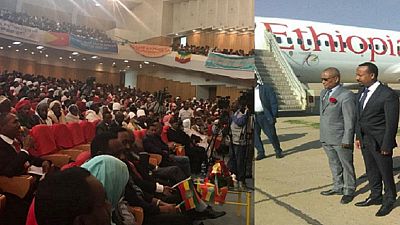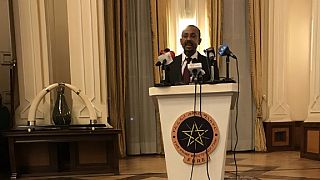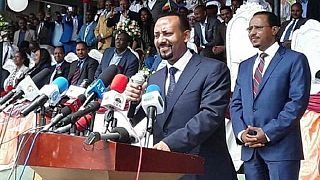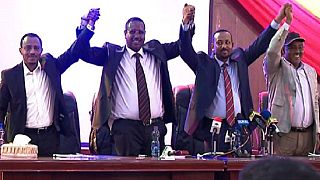Ethiopia
Ethiopian prime minister, Abiy Ahmed has continued his country tour, visiting the capital of the Tigray regional state, where he addressed war veterans and members of the community.
The reformist leader who has visited the restive Oromiya and Somali regions and met with opposition leaders since taking office on April 2, is hoping to quell protests that have rocked the country and mobilise support for democratic reforms.
Welcomed by the Tigray president, Dr. Debretsion Gebremichael, Abiy visited the Martyrs Monument in Mekelle, before addressing a public gathering at the Martyrs Hall in the Tigray capital.
Sources from the gathering said the premier addressed issues raised by the public that included free movement of citizens, infrastructure development and the Ethio-Eritrea conflict.
Ethiopia is currently under a state of emergency that was declared after the former prime minister Hailemariam Desalegn resigned in February.
Raised issues: big dams, railroad project, mekelle water problem, support to private sector, loan for investment, export support from national bank, tourism, public meter taxi for Mekelle, short lease proclamation for agriculture; public discussion with the PM Abiy Ahmed #Mekelle pic.twitter.com/2SRwcdkwSK
— Kindeya G.hiwot, PhD (@DrKindeya) April 13, 2018
A delegation led by PM Abiy Ahmed at martyrs hall #Mekelle #Tigray #Ethiopia; began with a moment of silence for the martyrs & impressive circus show pic.twitter.com/1aPSnmDL8l
— Kindeya G.hiwot, PhD (@DrKindeya) April 13, 2018
The ruling EPRDF coalition picked Abiy last month to replace Hailemariam Desalegn, who quit to clear the way for reforms in Ethiopia, Africa’s second most populous nation which has been racked by violence for the last three years.
Hundreds have been killed by security forces in Oromiya, the violence triggered by land rights but largely fuelled by a sense of political and economic marginalisation among the young.
After taking the oath of office, the former army lieutenant colonel struck a conciliatory tone and addressed the need for ethnic unity.
Since January Addis Ababa has released thousands of prisoners that included dissidents and journalists in a bid to calm discontent.
Last Friday, it also shut down a detention facility known as “Makelawi”, where rights groups have alleged that torture has taken place. The government plans to turn it into a museum.
The government has often been accused by rights groups of regularly using security concerns as an excuse to stifle dissent and media freedoms.














01:14
Boeing reaches settlement with man who lost entire family in 737 MAX Crash
01:13
China and Ethiopia reaffirm alliance at meeting on sidelies of BRICS summit
00:48
Cyril Ramaphosa arrives in Canada for G7 summit
Go to video
Kenya set to surpass Ethiopia as East Africa’s largest economy in 2025 – IMF
Go to video
World Food Programme to halt aid for 650,000 women and children in Ethiopia
Go to video
Ethiopians mark Easter with calls for peace and love amid ongoing conflict